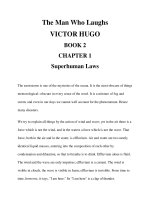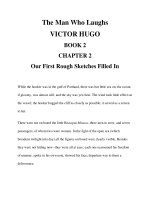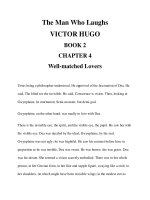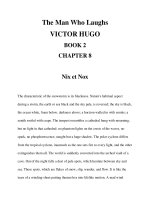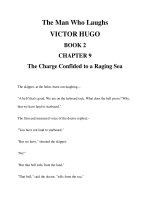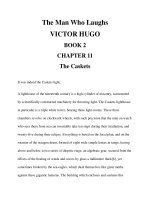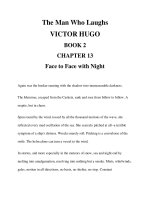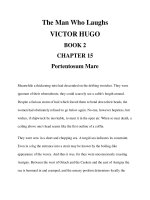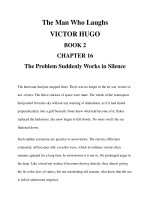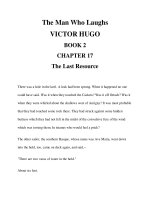The Man Who Laughs VICTOR HUGO PART 1 BOOK 3 CHAPTER 2 ppsx
Bạn đang xem bản rút gọn của tài liệu. Xem và tải ngay bản đầy đủ của tài liệu tại đây (19.26 KB, 8 trang )
The Man Who Laughs
VICTOR HUGO
PART 1
BOOK 3
CHAPTER 2
The Effect of Snow
He journeyed some time along this course. Unfortunately the footprints were
becoming less and less distinct. Dense and fearful was the falling of the snow. It
was the time when the hooker was so distressed by the snow-storm at sea.
The child, in distress like the vessel, but after another fashion, had, in the
inextricable intersection of shadows which rose up before him, no resource but the
footsteps in the snow, and he held to it as the thread of a labyrinth.
Suddenly, whether the snow had filled them up or for some other reason, the
footsteps ceased. All became even, level, smooth, without a stain, without a detail.
There was now nothing but a white cloth drawn over the earth and a black one over
the sky. It seemed as if the foot-passenger had flown away. The child, in despair,
bent down and searched; but in vain.
As he arose he had a sensation of hearing some indistinct sound, but he could not
be sure of it. It resembled a voice, a breath, a shadow. It was more human than
animal; more sepulchral than living. It was a sound, but the sound of a dream.
He looked, but saw nothing.
Solitude, wide, naked and livid, was before him. He listened. That which he had
thought he heard had faded away. Perhaps it had been but fancy. He still listened.
All was silent.
There was illusion in the mist.
He went on his way again. He walked forward at random, with nothing henceforth
to guide him.
As he moved away the noise began again. This time he could doubt it no longer. It
was a groan, almost a sob.
He turned. He searched the darkness of space with his eyes. He saw nothing. The
sound arose once more. If limbo could cry out, it would cry in such a tone.
Nothing so penetrating, so piercing, so feeble as the voice for it was a voice. It
arose from a soul. There was palpitation in the murmur. Nevertheless, it seemed
uttered almost unconsciously. It was an appeal of suffering, not knowing that it
suffered or that it appealed.
The cry perhaps a first breath, perhaps a last sigh was equally distant from the
rattle which closes life and the wail with which it commences. It breathed, it was
stifled, it wept, a gloomy supplication from the depths of night. The child fixed his
attention everywhere, far, near, on high, below. There was no one. There was
nothing. He listened. The voice arose again. He perceived it distinctly. The sound
somewhat resembled the bleating of a lamb.
Then he was frightened, and thought of flight.
The groan again. This was the fourth time. It was strangely miserable and
plaintive. One felt that after that last effort, more mechanical than voluntary, the
cry would probably be extinguished. It was an expiring exclamation, instinctively
appealing to the amount of aid held in suspense in space. It was some muttering of
agony, addressed to a possible Providence.
The child approached in the direction from whence the sound came.
Still he saw nothing.
He advanced again, watchfully.
The complaint continued. Inarticulate and confused as it was, it had become clear
almost vibrating. The child was near the voice; but where was it?
He was close to a complaint. The trembling of a cry passed by his side into space.
A human moan floated away into the darkness. This was what he had met. Such at
least was his impression, dim as the dense mist in which he was lost.
Whilst he hesitated between an instinct which urged him to fly and an instinct
which commanded him to remain, he perceived in the snow at his feet, a few steps
before him, a sort of undulation of the dimensions of a human body a little
eminence, low, long, and narrow, like the mould over a grave a sepulchre in a
white churchyard.
At the same time the voice cried out. It was from beneath the undulation that it
proceeded. The child bent down, crouching before the undulation, and with both
his hands began to clear it away.
Beneath the snow which he removed a form grew under his hands; and suddenly in
the hollow he had made there appeared a pale face.
The cry had not proceeded from that face. Its eyes were shut, and the mouth open
but full of snow.
It remained motionless; it stirred not under the hands of the child. The child, whose
fingers were numbed with frost, shuddered when he touched its coldness. It was
that of a woman. Her dishevelled hair was mingled with the snow. The woman was
dead.
Again the child set himself to sweep away the snow. The neck of the dead woman
appeared; then her shoulders, clothed in rags. Suddenly he felt something move
feebly under his touch. It was something small that was buried, and which stirred.
The child swiftly cleared away the snow, discovering a wretched little body thin,
wan with cold, still alive, lying naked on the dead woman's naked breast.
It was a little girl.
It had been swaddled up, but in rags so scanty that in its struggles it had freed itself
from its tatters. Under it its attenuated limbs, and above it its breath, had somewhat
melted the snow. A nurse would have said that it was five or six months old, but
perhaps it might be a year, for growth, in poverty, suffers heart-breaking reductions
which sometimes even produce rachitis. When its face was exposed to the air it
gave a cry, the continuation of its sobs of distress. For the mother not to have heard
that sob, proved her irrevocably dead.
The child took the infant in his arms. The stiffened body of the mother was a
fearful sight; a spectral light proceeded from her face. The mouth, apart and
without breath, seemed to form in the indistinct language of shadows her answer to
the questions put to the dead by the invisible. The ghastly reflection of the icy
plains was on that countenance. There was the youthful forehead under the brown
hair, the almost indignant knitting of the eyebrows, the pinched nostrils, the closed
eyelids, the lashes glued together by the rime, and from the corners of the eyes to
the corners of the mouth a deep channel of tears. The snow lighted up the corpse.
Winter and the tomb are not adverse. The corpse is the icicle of man. The
nakedness of her breasts was pathetic. They had fulfilled their purpose. On them
was a sublime blight of the life infused into one being by another from whom life
has fled, and maternal majesty was there instead of virginal purity. At the point of
one of the nipples was a white pearl. It was a drop of milk frozen.
Let us explain at once. On the plains over which the deserted boy was passing in
his turn a beggar woman, nursing her infant and searching for a refuge, had lost her
way a few hours before. Benumbed with cold she had sunk under the tempest, and
could not rise again. The falling snow had covered her. So long as she was able she
had clasped her little girl to her bosom, and thus died.
The infant had tried to suck the marble breast. Blind trust, inspired by nature, for it
seems that it is possible for a woman to suckle her child even after her last sigh.
But the lips of the infant had been unable to find the breast, where the drop of milk,
stolen by death, had frozen, whilst under the snow the child, more accustomed to
the cradle than the tomb, had wailed.
The deserted child had heard the cry of the dying child.
He disinterred it.
He took it in his arms.
When she felt herself in his arms she ceased crying. The faces of the two children
touched each other, and the purple lips of the infant sought the cheek of the boy, as
it had been a breast. The little girl had nearly reached the moment when the
congealed blood stops the action of the heart. Her mother had touched her with the
chill of her own death a corpse communicates death; its numbness is infectious.
Her feet, hands, arms, knees, seemed paralyzed by cold. The boy felt the terrible
chill. He had on him a garment dry and warm his pilot jacket. He placed the infant
on the breast of the corpse, took off his jacket, wrapped the infant in it, took it up
again in his arms, and now, almost naked, under the blast of the north wind which
covered him with eddies of snow-flakes, carrying the infant, he pursued his
journey.
The little one having succeeded in finding the boy's cheek, again applied her lips to
it, and, soothed by the warmth, she slept. First kiss of those two souls in the
darkness.
The mother lay there, her back to the snow, her face to the night; but perhaps at the
moment when the little boy stripped himself to clothe the little girl, the mother saw
him from the depths of infinity.
